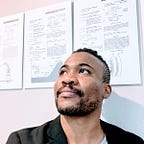MY EXPERIENCE WITH VON HIPPEL-LINDAU
When you think of cancer or in this case, the less famous cousin — VON HIPPEL-LINDAU, there is a plethora of possible emotional responses. In my case, when the ER doctor casually explained that my CT scan showed tumors in my pancreas, kidneys, and cysts in my liver, I was not terrified about the grimmest implications, renal cell carcinoma, rather, I was disappointed that I might be leaving my daughters untimely. Very little is known about Von Hippel-Lindau’s, in fact, the Nurse Practitioner that reviewed my metabolic result was surprised that such a condition existed. A deep analysis of the pathology of VHL is for the oncologists to revel in; for the sufferer it simply means that the gene responsible for preventing the spontaneous development of tumors drank too hard at the genetic mutation party and is now on permanent vacation. Your cells get raided. Every organ is in play. Kidneys, Liver, Pancreas, Adrenal glands, Retina, Brain, Spinal cord …
My mother died from complications of Von Hippel-Lindau’s and congestive heart failure. She had a “routine” brain surgery to remove a tumor from her brain or the so-called hemangioblastoma. A shunt was installed to drain the fluid from her intracranial cavity into her stomach. While this might seem standard for the seasoned practitioner, the regular folk freaks out at the notion of an integrated bio-mechanical cranial system. Shout out to the veterans who have so suffered and inspired breakthroughs in modern integrated biomechanical devices. For my mother, however, congestive heart failure implied edema, localized at the extremities. I have always maintained, perhaps, ignorantly and the reader might find my position altogether preposterous, that the cranial drain worsened her symptoms and contributed to reduced mobility and the eventual stroke that killed her. I imagine that the argument against my position rests on the expected total volume of the drain and the conservation of mass. Oh, well… Who knows, maybe it wasn’t a stroke. Septic shock from an infection is perhaps more likely and since she died during her visit to Nigeria, the physicians probably played “Eeny, meeny, miny, moe” and assigned a cause of death. Eh, why do a comprehensive autopsy, what is dead is dead, right? And it won’t bring her back, anyways. Moreover, God knows best. Let her rest, let her rest… Whereas these sentiments might seem traditional, they are misplaced medically. The point of the autopsy in this case is not to satisfy some vain academic curiosity but to establish credible family medical history. On the plus side, compared to actually being wrestled to the floor by militant family members when I tried to cry over the body at the morgue because they were “afraid I was going to jump into the freezer”, I should be thankful that the physicians played at sympathy and didn’t jab a scalpel through my friend’s throat as he asked question after question to determine the true cause of mother’s death.
Most cancer patients in the US and beyond have heard of MD Anderson. In fact, they make a note of reciting their credentials on the phone lines while you wait an eternity for someone to answer. I understand that the claims about providing the best of care inspires faith in the patients and boosts morale but a very long wait time does the reverse. In my experience, the time between learning about a potential diagnosis and the initial consultation with an oncologist is fraught with a lot of wild thoughts. Some thoughts are organized and systematic while others are plain ridiculous, even foolish but confronting your mortality daily, reminded by the pain coursing through your body is like a flood, sweeping through the deep recesses of your mind, bringing with it, decade old grievances, missed opportunities and almost certainly anger. After, a very long hold on the telephone trying to schedule my initial consultation at the VHL clinic, a monotonic voice breaks the looping MD Anderson credentials recital, runs through what I imagine is the standard checklist for new patients. Let’s just say, I have interacted with more cheerful AI systems. For a patient coordinator at a cancer hospital, it leaves a lot to be desired, especially dealing with new patients and their newfound confusion. However, what is the value of proper bedside manners in the face of survival…
